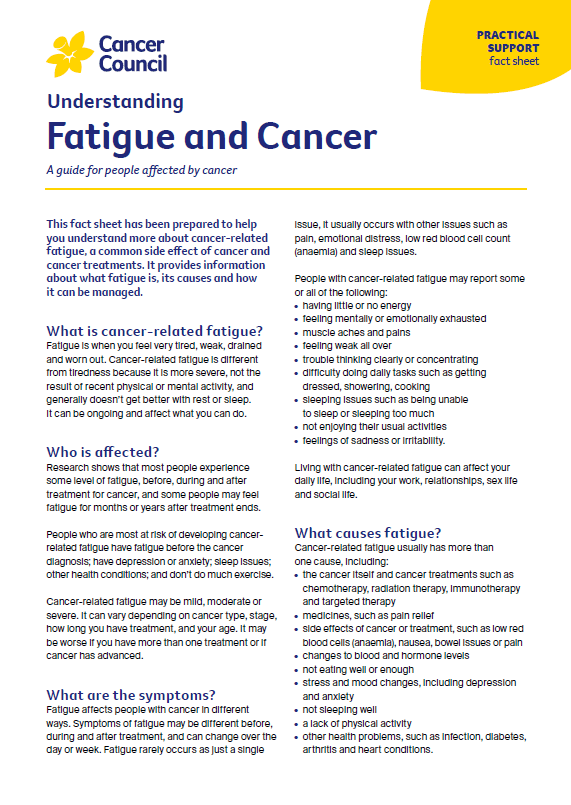- Home
- About Cancer
- Cancer treatment
- Radiation therapy
- Managing radiation therapy side effects
- Fatigue
Fatigue
Fatigue is feeling very tired and lacking energy for day-to-day activities. It is the most common side effect of radiation therapy to any area of the body. During treatment, your body uses a lot of energy dealing with the effects of radiation on normal cells. Fatigue can also be caused by travelling to daily treatment sessions and other appointments.
Fatigue usually builds up slowly during treatment, particularly towards the end, and may last for some weeks or months after treatment finishes. Many people find that they cannot do as much as they normally would, but others are able to continue their usual activities.
Learn more about fatigue and cancer and exercise and cancer.
How to manage fatigue
- Take regular short breaks.
- Plan activities for the time of day when you tend to feel more energetic.
- Ask family and friends for help (e.g. with shopping, housework and driving).
- Take a few weeks off work during or after treatment, reduce your hours, or work from home. Discuss your situation with your employer.
- Do some regular exercise, such as walking. This can boost your energy levels and make you feel less tired. Ask your treatment team about what type of exercise is suitable for you.
- Limit caffeinated drinks, such as cola, coffee and tea, if they affect your sleep or make you feel irritable.
- Avoid drinking alcohol.
- If you smoke, try to quit.
- Eat regular meals and have a balanced diet from the 5 food groups – fruit, vegetables and legumes, wholegrains, meat (or alternatives) and dairy (or alternatives).
Find information on radiation therapy in Arabic, Greek, Simplified and Traditional Chinese, and Vietnamese.
Podcast: Managing Cancer Fatigue
Listen to more of our podcast for people affected by cancer
Watch this video to see why eating well is so important after a cancer diagnosis, and what you can do to maintain a healthy diet.
Research shows that exercise benefits people with cancer during and after treatment. Find out more in this video or see our other exercise videos.
A/Prof Susan Carroll, Senior Staff Specialist, Radiation Oncology, Royal North Shore Hospital, and The University of Sydney, NSW; Katie Benton, Advanced Dietitian Oncology, Sunshine Coast Hospital and Health Service, QLD; Adrian Gibbs, Director of Physics, Radiation Oncology, Princess Alexandra Hospital Raymond Terrace, QLD; Sinead Hanley, Consumer; Dr Annie Ho, Radiation Oncologist, GenesisCare, Macquarie University Hospital and St Vincent’s Hospital, NSW; Angelo Katsilis, Clinical Manager Radiation Therapist, Department of Radiation Oncology, Royal Adelaide Hospital, SA; Candice Kwet-On, 13 11 20 Consultant, Cancer Council Victoria; Jasmine Nguyen, Radiation Therapist, GenesisCare Hollywood, WA; Graham Rees, Consumer; Nicole Shackleton, Radiation Therapist, GenesisCare Murdoch, WA; Dr Tom Shakespeare, Director, Cancer Services, Mid North Coast Local Health District, NSW; Gabrielle Vigar, Nurse Lead, Cancer Program, Royal Adelaide Hospital and Queen Elizabeth Hospital, SA.
View the Cancer Council NSW editorial policy.
View all publications or call 13 11 20 for free printed copies.
